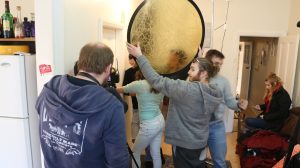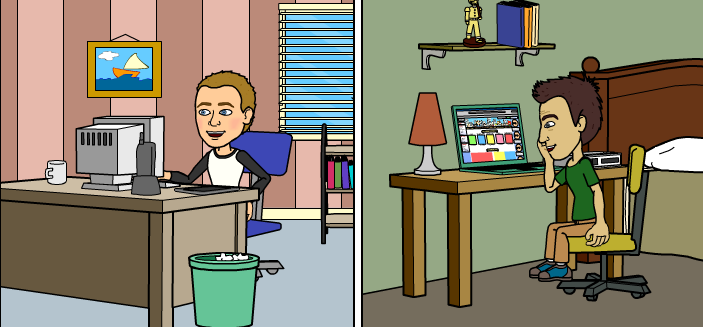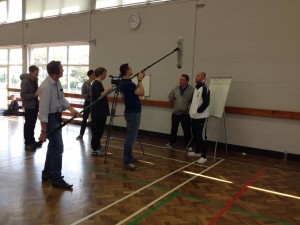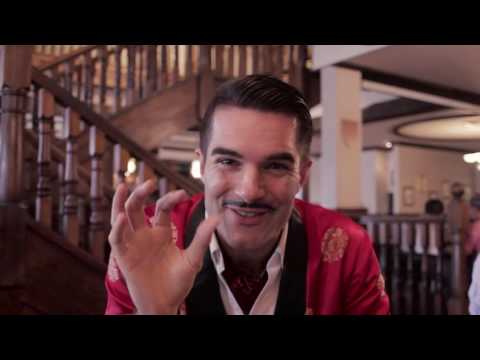The not so glamorous, yet career defining experience of creating a New Comedy Series
By Georgia Woodward
Producer of A Shared House
Reading about the life and work of comedy engineers Amy Poehler, Tina Fey and the gals from Broad City – I felt this overwhelming excitement as a young artist. I noticed the thing these broads had in common was that they were the creators of their work, they kick started their careers by getting people together to make good stuff. They didn’t sit around and wait for a phone call or a green light.
I was inspired by this attitude of being a part of a competitive industry by just literally doing it, taking the industry in your own hands by doing what you love. I contacted a Director, Joshua Lundberg who I had worked with in the past on a short film. We had always shared a similar sense of humour and witty banter– I thought he was a visionary Director; he’s one of those very rare ‘actors Director.’ Who treats his crew and cast like kings and queens. I said to him lightly one day ‘’ I want to make something fun, a series, lets just whip it up in our holidays for shits in giggles.”
What I wanted most was to collaborate with likeminded people and tell a good story in my spare time from drama school and work. Joshua agreed. We decided to strike whilst the iron was hot and we met a few days later over coffee to discuss creating a character driven comedy. We spit balled ideas around for hours around character, concept and form and walked away loaded with ideas.
A few more weeks went by, with no contact. Then one morning as I was sipping my morning coffee, it was around 530am, I received the 1st drafts of A Shared House. I always remember my gut reaction – I burnt my tongue on my coffee and I actually laughed out loud which isn’t always easy to do on paper. I could see these characters and the world they lived in so clearly, Josh had written with such rhythm and clarity it was enticing. Whilst the script still needed obvious polishing and development, I knew we were onto something.
Months went by, Josh was in the middle of a degree whilst writing the series, and I was at drama school also trying to get a degree. All through those months we worked and grew the world of A Shared House. Whilst we wanted to create something for fun both Josh and I share the same values in terms of professional, polished products and work by the mantra of “Do something, do it properly”.
We met with designers early in the process who designed our logo and the branding for the series; we went through the casting process and began our social media marketing (with no experience in the area). I can’t stress enough how much we winged, we learnt on the job. Very quickly A Shared House had gone from being this fun little project, to something we felt had legs and perhaps a journey ahead of it
 Then came production week. We gathered up our birthday and Christmas money to pay for food on set and few costumes, wrangled together a group of generous professionals and incredible talent. We felt very lucky to have such brilliant artists work for free.
Then came production week. We gathered up our birthday and Christmas money to pay for food on set and few costumes, wrangled together a group of generous professionals and incredible talent. We felt very lucky to have such brilliant artists work for free.
We had a week to shoot approx. 4 x 15 -20 minute episodes. Josh’s friends gave us their bachelor pad to shoot in. The only available week to shoot was in the winter. In 2015 July had its coldest winter on record during the week we shot. We shot out completely out sequence, our schedule made no practical sense but was the best we could do given time and money, our location was still being lived in the entire week, our family members catered and our lead character had curly hair with the actress (me) having straight hair = 3 hrs in make up.
It was a small pocket of time we had to get the work done, we had every obstacle you could imagine in the way. I was a first time producer and playing Charlotte, I’d arrive on set a 7AM and pull underwear off the line, scrub the bathroom and kitchen with our designer, Rhys Farmer and then be called into make up – it was a bizarre experience. Josh was allergic to hairspray but we needed a tone of it to keep my curls in tact and it was mother f****ing freezing!
Much to Josh and my surprise and delight, there wasn’t an argument during the entire shoot. Our cast and crew worked like one big machine – listening and building on each other’s ideas. We all embraced the reality of working on an indie production and laughed the entire time. It sounds lame, but it was truly magic, everyone was there because they loved the script and wanted to see it made, everyone wanted to do what they enjoy doing in a business where it’s not always that easy. There is an incredible energy that comes from experiences like that, I believe that it develops and engages an artist’s muscularity, patience and teamwork like no other experience really can.
We left the house and went into post production, Josh was up to his ears in editing for a few of his student films that he was working on at the same time, And I had dropped out of school to work on ASH, I had a gut feeling that this show was a game changer and I needed to wholeheartedly participate, I have never regretted it. After many anxiety attacks, sleep less nights, endless conversations – Season 1 of A Shared House went Live on Friday November, 13th 2015. The same day as the dreadful Terrorist attacks in Paris, a terrible time to release a comedy series on the Internet, we just felt really wrong. On a business end, it meant rightfully so…no one would be watching our show.
 A Shared House hit over 1,300 views on it’s first weekend live (a sweet little achievement for an unknown intellectual property) and was titled “The Best Web Series of 2015” by online web series critic WEBSERIES2WATCH (WHAT U WANT 2 WATCH), It received a 9/10 rating by The AU Review and was well received by it’s audiences. It kick started it’s festival journey with an Official Selection at LA Web Fest to take place in April 2016 at Warner Brothers Studio in Burbank, California.
A Shared House hit over 1,300 views on it’s first weekend live (a sweet little achievement for an unknown intellectual property) and was titled “The Best Web Series of 2015” by online web series critic WEBSERIES2WATCH (WHAT U WANT 2 WATCH), It received a 9/10 rating by The AU Review and was well received by it’s audiences. It kick started it’s festival journey with an Official Selection at LA Web Fest to take place in April 2016 at Warner Brothers Studio in Burbank, California.
Since the day of it’s release Josh, the team and myself continued to find ways to better the series. In terms of it’s social media presence, marketing strategies and planning for future seasons. We aimed to expand our audiences by releasing a Mandarin Subtitled version of the series. A Shared House was fast becoming a business.
Web Series need to fight hard for viewership with the internet having such high traffic it can be a relentless task to get an audience however the web series format, I feel gives such ownership and opportunities for artists to get their stories out their and flex their creative muscles.
In January 2016 we announced that we would make a Season 2 of ASH with intentions of improving every single element we can. This included starting a writer’s room to get fresh minds developing the project and to achieve sharper, more comedic ally rich writing for S2. We are launching a crowd funding campaign on Thursday March 10 2016 with Pozible to hopefully lock done some funds to increase all areas of production values.
A Shared House was a game changer and has high hopes for the future. It’s been a huge journey, with our goals getting bigger everyday. Our cast and crew have become a family and a team that works efficiently. A Shared House was made with a whole lotta love and dedication, enjoy and welcome to the house!








